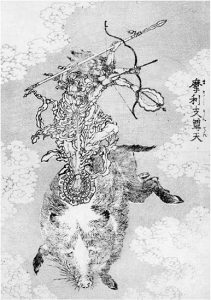Samurai Zen
The Warrior Koans unites 100 of the rare riddles representing the core spiritual discipline of Japan’s ancient samurai tradition. Dating from the thirteenth-century records of Japan’s Kamakura temples, and traditionally guarded with a reverent secrecy, they reflect the earliest manifestation of pure Zen in Japan as created by Zen Masters for their warrior pupils.
Unlike the classical Chinese koan riddles, the Japanese koans used incidents from everyday life – a broken teacup, a water-jar, a cloth – to bring the warrior pupils of the samurai to the Zen realization. As key preparatory tests, they were direct attempts to waken the sleeping wisdom in each man, found in the region of conscious meditation that is without thought. Their aim was to enable a widening of consciousness beyond the illusions of the limited self, and a joyful inspiration in life – a state that has been compared to being free under a blue sky after imprisonment.
Hokusai: The war-god Marishi (from India) using bow, spear, sword and fan with his various arms without confusion, while balancing on the back of his ‘vehicle’, a wild boar. This is to illustrate ki filling the whole body and each single function without being concentrated to the detriment of the others. (Hokusai Manga volume 6, image of Marishi Japanese Illustrated Book 216/ 1942.9–19.03, Vol 6 © Copyright The British Museum)
